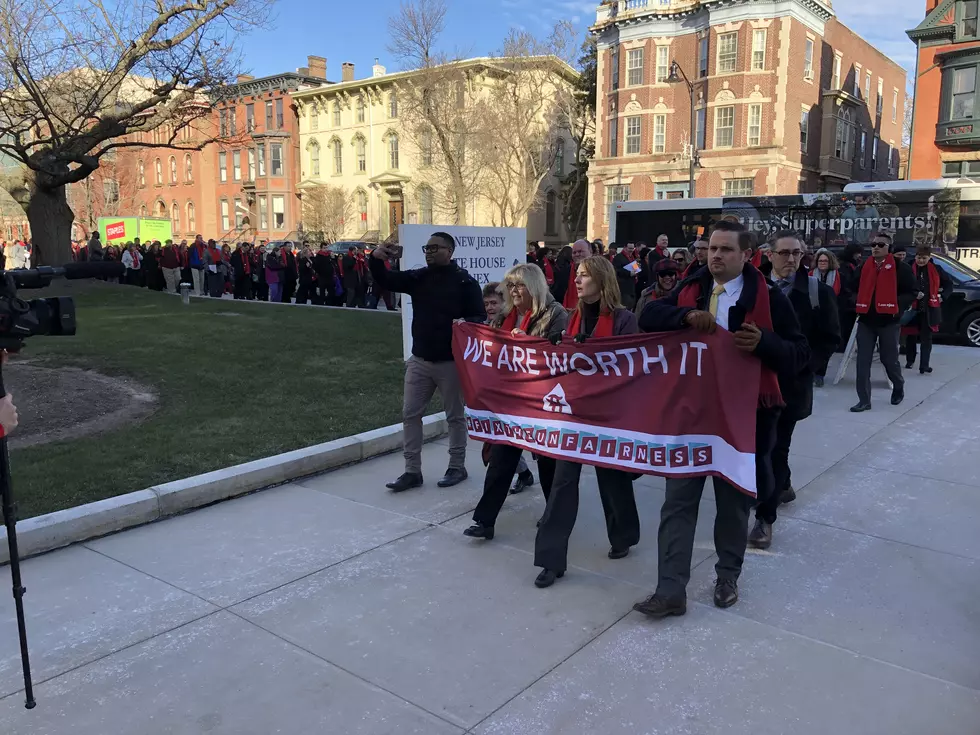
Merge teachers’ health plan? Murphy, Sweeney far apart on idea
Senate President Steve Sweeney is expected to soon begin introducing the legislation that would enact recommendations in the Path to Progress report. Priority one appears to be merging the state’s health plans for teachers into the one for other public workers.
Sweeney, D-Gloucester, says if the change is made, taxpayers could save hundreds of millions of dollars and individual teachers could pay as much as $3,000 less a year toward their health insurance, although they would face higher out-of-pocket health-care costs.
Gov. Phil Murphy said he doesn’t think the math in Sweeney’s plan is accurate, given savings in health-care spending achieved through collective bargaining. He says that’s a better way than telling people what is going to change.
“It’s another thing for you to come to the table, even when we disagree, roll up our sleeves, get all of us together and hammer something out. And that’s the road that we’re going down,” Murphy said.
Sweeney doesn’t think his savings estimates are wrong.
“We think we took a very conservative approach,” he said. “And if my numbers are wrong, just produce yours and prove to me I’m wrong.”
The Path to Progress report recommends a sweeping overhaul of government, such as requiring small school districts to merge into more regional K-12 systems. There are also pension changes that would reduce government spending over time though have a more limited short-time impact.
Reductions in health-care spending could yield more immediate savings, and Sweeney said it wouldn’t mean providing workers and retirees with subpar care. He credits the state workers’ Communications Workers of America union for agreeing to a new, lower-cost health plan in its newly ratified contract.
“That was a move in the right direction. Workers are paying less. They have quality insurance, and there’s savings to be had. I just believe there’s a lot more savings to be had,” Sweeney said.
The New Jersey Education Association has been pushing for reduction in how much public school employees pay toward their health coverage. The new CWA contract offers a health plan that ties contributions to salary instead of premiums – but its benefits are less generous.
The NJEA says health benefits are negotiated locally and that any changes should be made the same way. Murphy and his administration say they’ll keep an open mind but aren’t inclined to change the health plan through a state law unless the union agrees to go along.
“I’m not turning my back on anything that can save us money, but I want to do it together and I want to make sure it lasts,” Murphy said. “And that’s an important point – that the stuff we do sticks, and they’re buy-in. Because when it sticks and there’s buy-in, that means it’s permanent and it’s real.”
At the Senate Budget and Appropriations Committee’s opening day of its budget review, state Sen. Paul Sarlo, D-Bergen, said the details on the potential health-plan merger are just starting to come in but wanted to know if the Murphy administration would consider such a change.
“There is a savings to the state. Believe it or not, there is a bigger savings to the local governments and county governments,” Sarlo said. “That’s where there’s a bigger savings. It won’t be reflected in our state budget.”
Treasurer Elizabeth Muoio said without more details, it’s hard to say.
“I think we’re all interested in savings,” Muoio said. “The tact that the governor has taken on the savings that we have scored in this budget has been through negotiations and collaboration.”
New Jersey: Decoded cuts through the cruft and gets to what matters in New Jersey news and politics. Follow on Facebook and Twitter.
Michael Symons is State House bureau chief for New Jersey 101.5 and the editor of New Jersey: Decoded. Follow @NJDecoded on Twitter and Facebook. Contact him at michael.symons@townsquaremedia.com
More From New Jersey 101.5 FM









